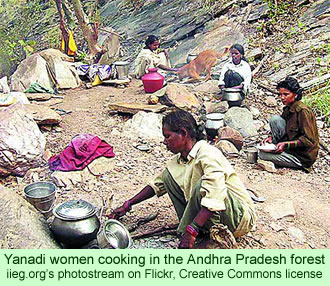Tupakula Munemma, the young Yanadi woman who made a big impression in India during an election campaign rally in Hyderabad in 2008, is back in the news again. Ms. Munemma gave a speech at a political convention in the fall of 2008; then she ran for a seat in the state legislature of Andhra Pradesh as a candidate representing a new political party headed by the film star Chiranjeevi.
Both were subsequently defeated, but Ms. Munemma has continued to develop a career as a leader in tribal and women’s rights issues. Ms. Munemma started a website in May 2011, but it has not been updated since August that year. A news story in 2012 reported how she was working with a human rights group to champion the poor Yanadi people who had been cheated out of parcels of land by the wealthy land barons of the state.
A news story last week describes her participation at an event held in December in Delhi called the “Women’s Parliament.” Ms. Munemma (her name was spelled “Monemma” in the recent news story) provided an update on her campaigns to improve the rights of women and girls, particularly in her native district of Nellore, in Andhra Pradesh.
She emphasized that she is anxious to promote the cause of women’s rights. “Too much time has been lost already” she said. “Women themselves are oblivious of their value and are mock spectators to the unfolding of their destinies. Even though I lost the Andhra Assembly election in 2009, by a narrow margin of 6,000 votes, I am committed to giving women a voice and unleashing their inner potential.”
She said that 25,000 Yanadi families in the Nellore District live under conditions of bondage. Furthermore, over 12,000 acres of land that should belong to them is held illegally by the wealthy land barons of the district, called “zamindaars” in the news report. She decried the fact that no one in the government is working to restore those lands to their rightful owners.
Ms. Munemma urged appropriate government officials in the labor and revenue departments to visit the Yanadi villages in Nellore in order to assess the situation for themselves and take actions to right the injustices. The journalist reporting on the Women’s Parliament writes that “there was a lot of passion, conviction and hope in her voice.
Ms. Munemma joined about 80 other women from throughout India as a delegate to the first Women’s Parliament. The purpose of the event was to empower the women’s movement in the country with a more active, physical voice, particularly with an approach that would suggest a firm political purpose. The movement that initiated the Women’s Parliament was focused initially on the child sex discrepancy in the nation, but it has since become an advocate for a broader range of issues in India that affect women and girls: child marriages, trafficking, domestic violence, physical attacks, female infanticide, and discrimination relating to land distribution. The news report indicates that there is some awareness of those issues in India, but not much firm action is being taken.
The Women’s Parliament was held in the national capital in order to demonstrate for the real parliamentarians issues that they should address. It was structured to resemble the real parliament, with mock government ministers, opposition members, and a Speaker chosen to preside. While rallies and boycotts for women’s rights have had their place in the Indian political and social scene, this mock parliament evidently had an impact.
The Women’s Parliament provided a venue for women such as Ms. Munemma to use their oratorical skills and articulate their issues effectively enough to gain the attention of the nation’s decision makers. Issues such as the access of Dalit (untouchable) women to land, equality of rights to property for women, participation of women in the political process, disability issues, social security, and many more were presented. For just one example of the existing situation in India, the lower house of the national parliament, the Lok Sabha, has 543 members, of whom only 11 percent are women.
